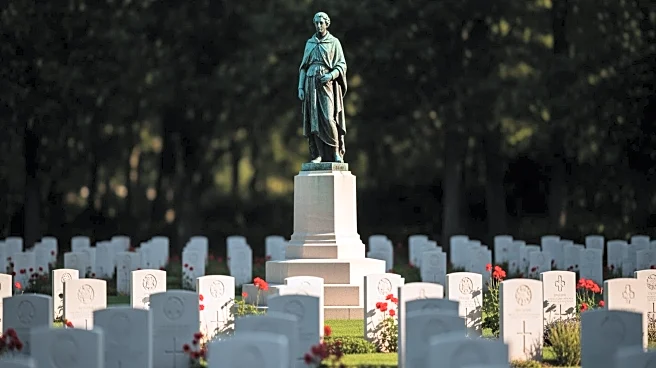What's Happening?
Ben Soppitt, a campaigner for the restoration of Commonwealth war graves in Iraq, has criticized the Commonwealth War Graves Commission (CWGC) for failing to maintain the war cemeteries in the region.
Soppitt, who is honoring his grandfather at the Basra War Cemetery, highlights the poor condition of these sites, which have been neglected since the CWGC withdrew from Iraq in the 1990s due to security concerns. The Basra War Cemetery, where nearly 3,000 soldiers are buried, has become a wasteland, with no official markings on the graves. Soppitt's grandfather, Gunner Joseph Soppitt, is among those buried there. The CWGC had previously cleared the site of headstones after they were vandalized or fell into disrepair, but plans to replace them have not been realized. Soppitt's campaign aims to bring attention to this issue and push for the restoration of these cemeteries.
Why It's Important?
The neglect of Commonwealth war graves in Iraq raises significant concerns about the commemoration of soldiers who lost their lives in the region. The issue highlights a broader problem of historical inequality in the commemoration of soldiers, particularly Indian nationals who served in the ranks and are not individually named on memorials. This neglect not only disrespects the memory of those who served but also reflects poorly on the CWGC's commitment to honoring all soldiers equally. The campaign by Ben Soppitt brings to light the need for renewed efforts to address these disparities and restore the dignity of these sites. The situation also underscores the challenges faced by international organizations in maintaining historical sites in conflict-prone areas.
What's Next?
The CWGC has promised to address the inequality in commemoration, particularly concerning Indian casualties in Iraq. However, the restoration of these sites will require significant resources and a commitment to overcoming the security challenges that have hindered progress in the past. Ben Soppitt's ongoing campaign and documentation of the state of these cemeteries may increase public pressure on the CWGC and relevant authorities to take action. The restoration of these sites could serve as a step towards rectifying historical wrongs and ensuring that all soldiers are honored appropriately.
Beyond the Headlines
The neglect of war graves in Iraq also raises ethical questions about the responsibilities of former colonial powers in maintaining the legacy of their military history. The disparity in the commemoration of soldiers from different nationalities reflects broader issues of historical injustice and the need for reconciliation. Addressing these issues could contribute to a more inclusive and equitable approach to historical memory and commemoration.










